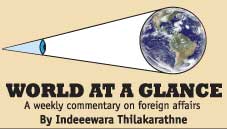|

Libya urged to examine Muammar Gaddafi's death
The UN called for a full investigation, after video footage showed
Col Gaddafi captured alive - and then dead. His burial has been delayed
with officials divided about what to do with the body. A post-mortem is
expected. NATO says it will end its campaign in Libya by 31 October.
The alliance's Secretary General, Anders Fogh Rasmussen, said that as
the mission winds down, Nato "will make sure there are no attacks
against civilians during the transition period". NATO's seven-month
campaign of air strikes was carried out under a UN mandate authorising
the use of force to protect civilians in Libya. For the people here the
manner of the colonel's death matters little. What counts is that he's
gone, and crucially, that Libyans believe he won't be coming back.
That perhaps in part explains the delay to the funerals. But as
details emerge about his final moments questions are being raised to
which at the moment there are no clear answers. Col Gaddafi was captured
alive. People we've spoken to say he was relatively unharmed. But then
he was set upon by an angry mob. In mobile phone footage fighters could
be heard arguing over whether or not to kill him. Several hours later he
was pronounced dead from a bullet wound to the head.
No-one knows who fired the shot. Hundreds of Libyans have been
queuing to get a glimpse of the body of Col Gaddafi in a meat storage
room in Misrata. The BBC's Gabriel Gatehouse in the city says some -
mostly women - craned their necks to see the body of his son Mutassim,
who was also killed on Thursday. Officials, including acting Prime
Minister Mahmoud Jibril, have also been to see the corpses. Oil Minister
Ali Tarhouni told Reuters Col Gaddafi would not be released for
immediate burial.
Capitalism and its critics rage against the machine
From Seattle to Sydney, protesters have taken to the streets. Whether
they are inspired by the Occupy Wall Street movement in New York or by
the indignados in Madrid, they burn with dissatisfaction about the state
of the economy, about the unfair way that the poor are paying for the
sins of rich bankers, and in some cases about capitalism itself. In the
past it was easy for Western politicians and economic liberals to
dismiss such outpourings of fury as a misguided fringe. In Seattle, for
instance, the last big protests (against the World Trade Organisation,
in 1999) looked mindless.
If they had a goal, it was selfish-an attempt to impoverish the
emerging world through protectionism. This time too, some things are
familiar: the odd bit of violence, a lot of incoherent ranting and
plenty of inconsistency. The protesters have different aims in different
countries. Higher taxes for the rich and a loathing of financiers is the
closest thing to a common denominator, though in America polls show that
popular rage against government eclipses that against Wall Street. Yet
even if the protests are small and muddled, it is dangerous to dismiss
the broader rage that exists across the West. There are legitimate
deep-seated grievances.
Young people-and not just those on the streets-are likely to face
higher taxes, less generous benefits and longer working lives than their
parents. More immediately, houses are expensive, credit hard to get and
jobs scarce-not just in old manufacturing industries but in the ritzier
services that attract increasingly debt-laden graduates.
Europeans seek bold debt deal, despite differences
European leaders were struggling on Friday to craft a bolder solution
to the region's financial crisis, despite clear signals from French and
German officials that they have sharp differences heading into an
important weekend summit meeting in Brussels. As ever, the focus is on
Chancellor Angela Merkel of Germany and President Nicolas Sarkozy of
France, who have made a habit of cobbling together deals to present to
their European Union colleagues.
But forging an agreement now is harder than before, as Paris and
Berlin face core differences over how to maximise the euro zone's
financial rescue fund and how far the European Central Bank should
intervene in the bond markets, either on its own or through the bailout
fund. Already the two leaders have announced that Sunday's summit
meeting, which had already been delayed to allow more time for
negotiations, would be followed by another summit meeting as early as
Wednesday.
That announcement, paradoxically, seemed to buoy stock and bond
markets, apparently because the Europeans at least appeared to be
focusing intensely on resolving the crisis. But the delay may have been
because Mr. Sarkozy needs pressure from other nations to bring Mrs.
Merkel around to a more flexible position on how to use the bailout
fund, called the European Financial Stability Facility, and the central
bank. Mr. Sarkozy has now rushed twice to Germany for talks with Mrs.
Merkel, the last time on Wednesday, as his wife was giving birth, to
press for a deal.
The meeting was testy, said German officials, who have complained
that France is "not budging an inch." Mr. Sarkozy, clearly the
supplicant in the relationship, speaks openly of a "European rendezvous
with history," while Mrs. Merkel keeps repeating that "there is no magic
wand" and that a long-term solution will take time. |

